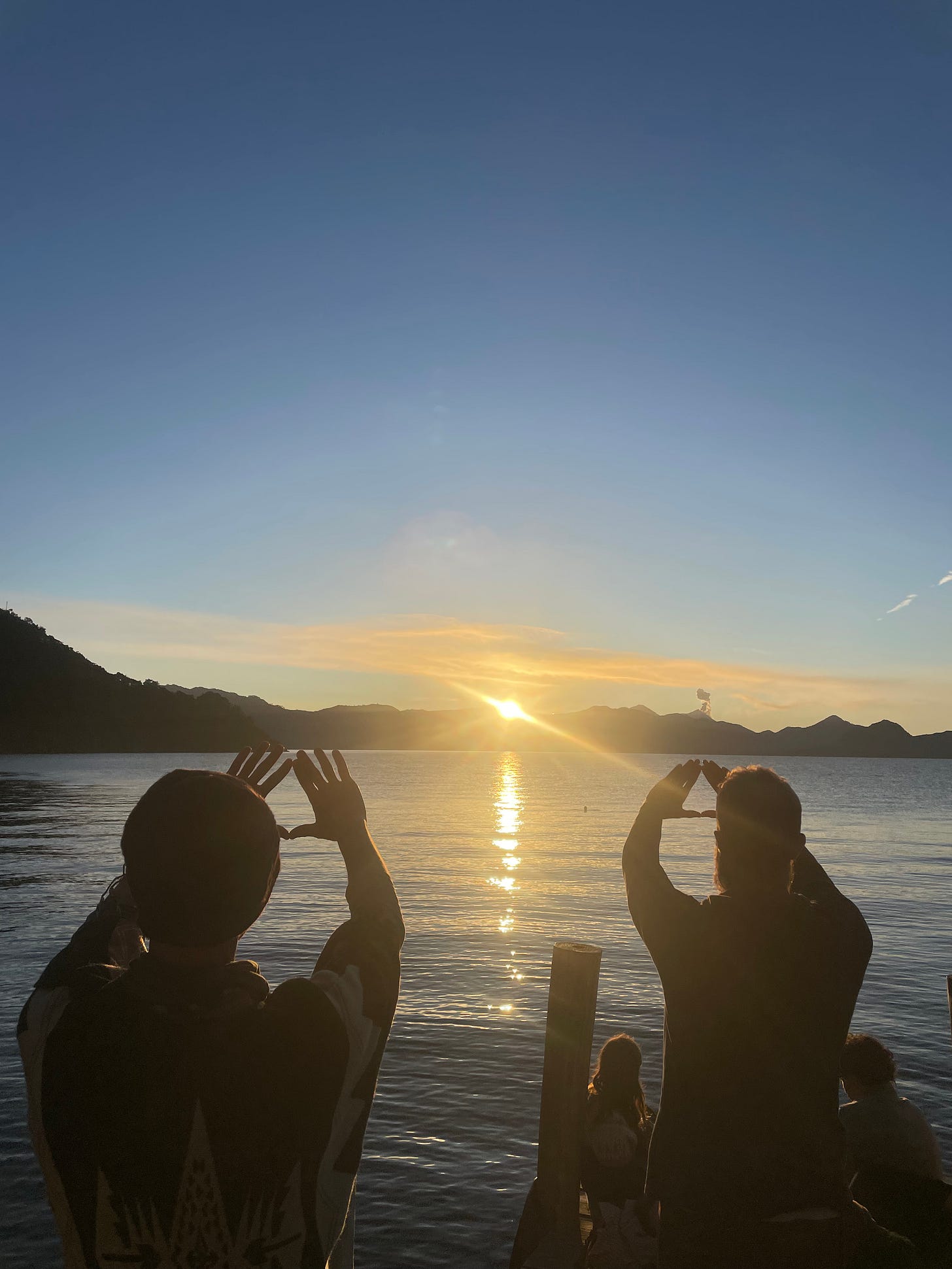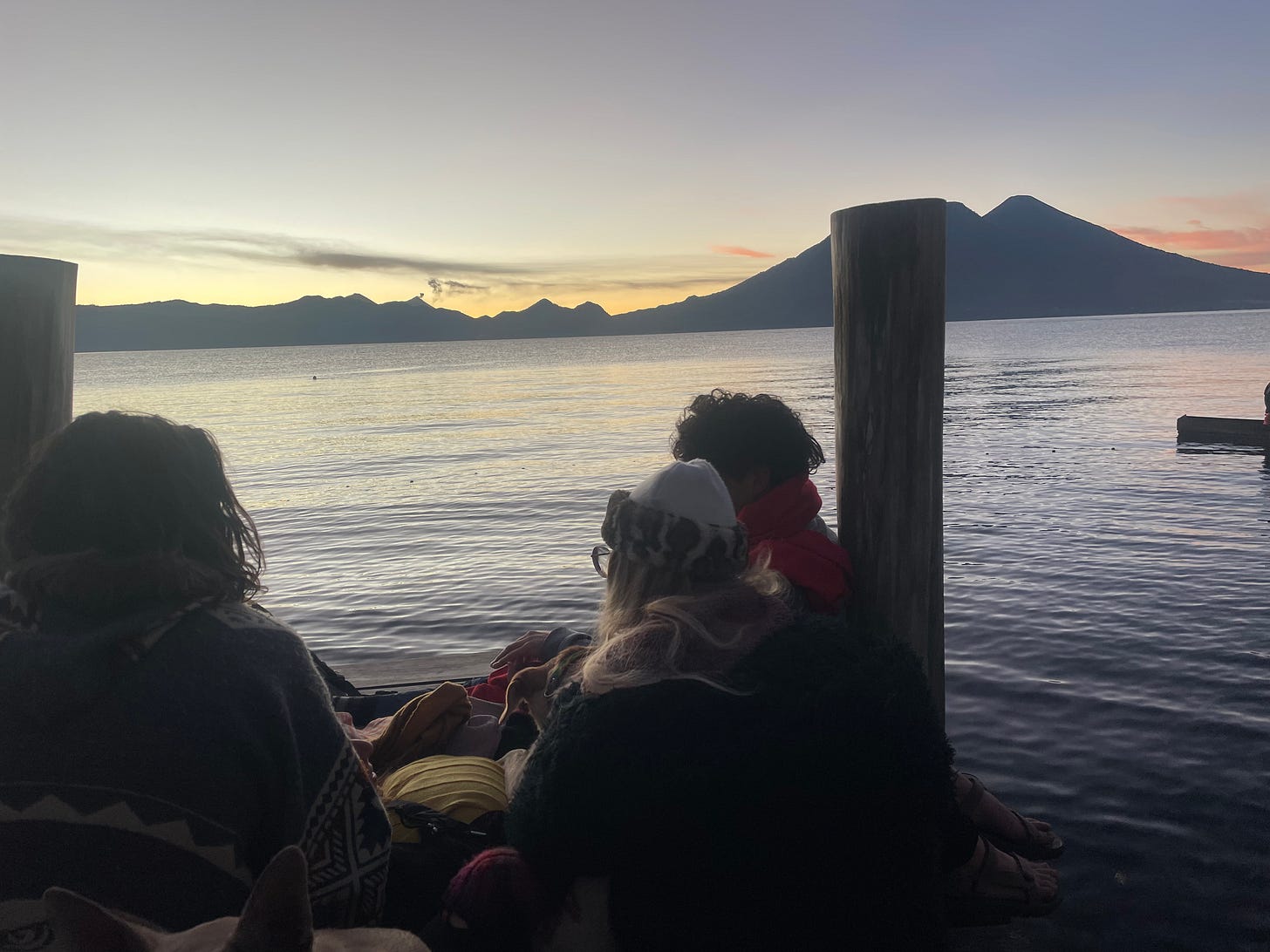Happy Winter Solstice, everyone.
Why are these moments so potent and important? They focus our energies and intentions—if we allow them. As we pass our days in our busy worlds, with our attention drawn to so many things, a moment like the Solstice reminds us to look up again, to remember that we are part of something far greater, and to contemplate our place in the vast cosmos.
At Solstice time, I reflect on the cyclical nature of reality and my life. I envision the circles that surround me. The first and closest is myself. The next circle encompasses my closest loved ones—my family. Beyond that lies a circle of dear friends, then acquaintances, and further still, the community I live in: the people I pass by each day and share a word or two with. Finally, I think of the world itself and all those, human and non-human, who inhabit it.
Everything is interconnected, and at Solstice time, I find my awareness of these greater realities brought into much sharper focus.
The word "solstice" comes from the Latin solstitium, meaning "sun stands still." It marks the moment when the sun appears to pause at its highest or lowest point in the sky before reversing its direction. For centuries, Solstice has been a time of profound significance, symbolizing the cycles of light and darkness, death and rebirth. It reminds us of the natural rhythms that govern our lives and the planet, offering a moment to pause, reflect, and realign with these greater forces. In its stillness, the Solstice invites us to be still ourselves and thus better embrace the promise of renewal.
On Solstice morning, I woke at 4 a.m. after dreaming, incidentally, of a solar eclipse. I met a group of friends on the road, including several of their dogs, who roamed around with energetic mischief. We walked to the lakeshore of Lake Atitlán and sat on a shaky old wooden pier to await the sun. Its still-hidden face illuminated a low string of clouds with a fiery reddish-pink glow. As we sat, a fisherman emerged from the bush and greeted us. He pushed his rudimentary boat—a wooden board with four sides—into the lake waters and paddled away to his nets. The rhythmic striking of his paddle against the water was the only sound.
That morning, my thoughts were with all my family and friends at home in Ireland. Pictures had already begun to stream in of the sun rising at Newgrange. Images of rosy-cheeked Irish people smiling and huddled close against the cool morning breeze in County Meath filled my mind, connecting me to them across the miles. And it couldn’t help but draw my awareness to the contrast between these two places at this time.
There is a dramatic difference in day length between Ireland and Guatemala, as shaped by their latitudes. In Ireland, situated at approximately 53° north, the contrast between summer and winter solstices is striking. On the summer solstice, Ireland enjoys about 17 hours of daylight, while on the winter solstice, daylight shrinks to roughly 7.5 hours—a difference of nearly 9.5 hours. This dramatic variation occurs because Ireland's higher latitude experiences more pronounced tilting of the Earth’s axis relative to the sun throughout the year.
In Guatemala, located much closer to the equator at around 15° north, the variation is far less pronounced. On the summer solstice, daylight lasts approximately 13 hours, while the winter solstice sees about 11 hours of daylight—a difference of just 2 hours. The near-equatorial position ensures a relatively consistent exposure to the sun year-round, with the day length changing only slightly between seasons.
These differences not only highlight the influence of latitude on the Earth’s axial tilt but also affect how the Solstice is experienced culturally and physically in each region. In Ireland, the stark contrast emphasizes seasonal shifts, while in Guatemala, the Solstice reflects subtler transitions in the rhythm of light and dark.
Thus, the Winter Solstice is a very different experience here. The contrast between light and dark is less pronounced, and the hope-inducing turn from the deepest, darkest days toward the light of summer holds less potency in this land of eternal spring than it does in Ireland. I would never trade the beauty of the changing seasons and having grown up in a place that fused those cycles into my psyche for more sunshine and a land that is kissed more by sun. The sunrise yesterday morning was short and in no way as striking as the long and languid displays one can enjoy back home. It is no wonder that painters travelled to those parts of the world to try and capture the shifting colours on their canvas.
The Solstice, as Michael Meade reminds us, is a time to reflect on the profound balance inherent in nature—the equilibrium between light and dark, rest and growth. He writes, "It is in the darkest times that the brightest lights must be lit, and the deepest prayers must be uttered." This moment offers not only a chance to find balance within ourselves but also to focus on healing the divisions in the world around us. It is a time to pray for peace and harmony, and to recognize the polarizations that fracture our communities, nations, and planet.
The Solstice urges us to embody the light, to become agents of healing and forces for good, not only for our own well-being but for the wider world. Just as the Earth tilts back toward the sun, so too must we actively tilt our efforts toward justice, kindness, and repair. This is no passive endeavor—it requires our conscious participation in the work of mending what is broken.
As Martin Luther King Jr. powerfully wrote in his Letter from Birmingham Jail:
"We must come to see that human progress never rolls in on wheels of inevitability. It comes through the tireless efforts of men [and women] willing to be co-workers with God, and without this hard work, time itself becomes an ally of the forces of social stagnation."
The Solstice reminds us that waiting for healing and peace to simply arrive is not an option. We are called to act, to shine our light in the darkness, and to be active participants in the transformation of ourselves, our communities, and our planet.
Blessings to everyone at this new cycle.
Stay warm and well and close to loved one’s this holiday season.
D








Aho and thank you for this brother 🙏 I’m feeling a cold and dark turning of the seasons here at 40 degrees latitude in Philadelphia. It’s not quite as drastic as the change experienced in Ireland, but sure feels dark at times. Looking forward to the light that is dawning upon us all. Solstice blessings to you ☀️🕊️